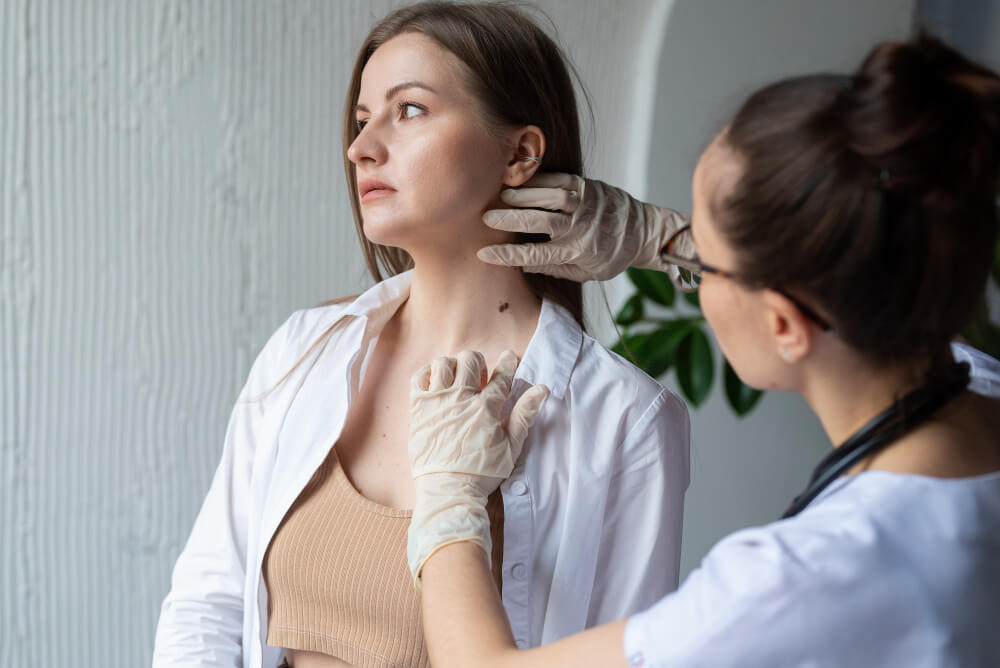Skin cancer is common, but finding it early makes it easier to treat. At Comprehensive Hematology Oncology, we talk to many people who want to stay healthy and understand their risk. If you are looking for Cancer Treatment Tampa FL, knowing about skin cancer screening is the first step.

What Skin Cancer Really Is
When certain skin cells begin to grow improperly, skin cancer results. Most start in one spot, but some types can spread if not caught. The main types are:
- Basal cell carcinoma – grows slowly and is very common
- It is possible for squamous cell carcinoma to spread and grow faster.
- Melanoma – less common but more serious because it can move to other parts of the body
Anyone can get skin cancer. People with light skin or many moles have a higher chance, but even people with dark skin can get it. Being in the sun a lot, especially without protection, makes the risk bigger.
Why Screening Matters
Screening means looking at your skin often to see if there are any new or unusual spots. Some skin cancers do not cause pain in the beginning, so waiting until it hurts might be too late. Finding it early makes treatment easier and more likely to work.
Even if your skin looks fine, a screening helps spot changes that might not be obvious.
How Skin Cancer Screening Works
A skin check is fast and painless. A doctor or nurse looks at your skin from head to toe, checking for:
- New moles or changes in existing moles
- Spots with uneven edges or colors
- Red, rough, or scaly patches
- Sores that do not heal
If something looks suspicious, a small piece of skin may be taken (biopsy) to test for cancer.
Checking Your Skin at Home
You don’t need to wait for a doctor. Check your skin at home every month. To see hard-to-reach places, use a mirror. To see any changes, you can also take photos of moles.
Tips for home checks:
- Check ears, scalp, nails, and between fingers and toes
- Notice new moles or changes in old ones
- Watch for sores that bleed or don’t heal
- Look for dark or unusual spots
Call your doctor if you see anything unusual.
Who Is More Likely to Get Skin Cancer
Some people are at higher risk:
- Fair skin or light hair
- Sunburns or tanning bed use
- Family history of skin cancer
- Weak immune system
- Exposure to certain chemicals
People at higher risk may need more frequent screenings.
How to Protect Your Skin
Protecting your skin is simple and effective:
- Use sunscreen with SPF 30+ every day
- Wear hats, sunglasses, and long clothes
- Stay in the shade during midday sun
- Avoid tanning beds
Small steps like these help keep your skin safe.
What Happens If Skin Cancer Is Found
The doctor describes the course of treatment if skin cancer is found. It depends on type and stage. Treatment may include surgery, creams, or other therapies. Early detection usually makes treatment easier.
Comprehensive Hematology Oncology helps you along the way. If you need Cancer Treatment Tampa FL, we explain everything clearly so you know what to expect.
How Often Should You Get Checked
The frequency of checks depends on your risk. Risky individuals could require examinations every six to twelve months. Low-risk people may only need one per year. Your doctor helps you decide what’s best.
Skin Cancer in Kids and Teens
Children and teens can get skin cancer too. Protecting young skin is very important:
- Use sunscreen daily
- Wear hats and protective clothing
- Avoid tanning beds
- Notice new or changing spots
Teaching these habits early helps kids stay safe in the sun.
Myths About Skin Cancer
Some myths can stop people from getting checked:
- Myth: Only fair-skinned people get skin cancer.
Fact: Anyone can get it. - Myth: Skin cancer always hurts.
Fact: Most skin cancers do not hurt at first. - Myth: You only need to check if you see a spot.
Fact: Regular checks are important even when your skin looks normal.
Choosing the Right Clinic
Going to a clinic you can trust is very important. At Comprehensive Hematology Oncology, we provide care in a simple and friendly way. We answer your questions and support you at every step. If you are looking for Cancer Treatment in Tampa, FL, we help you know your choices clearly.
Signs to Watch For
Keep an eye on:
- Moles that change color, shape, or size
- Growths that itch, bleed, or crust over
- Dark spots with uneven edges
- Sores that do not heal
Early action can make a big difference.
Healthy Habits for Your Skin
Healthy skin is about more than sun protection:
- Eat fruits and vegetables
- Drink plenty of water
- Avoid smoking
- Limit alcohol
Small habits help your whole body and skin stay healthy.
Getting Ready for a Screening
Before your appointment:
- Wear loose clothes so the doctor can check easily
- Remove nail polish and makeup
- Note any spots you are worried about
- Bring your medicines and health information
Being prepared helps the doctor do a thorough check.
Conclusion
Checking your skin for cancer is simple but very important. At Comprehensive Hematology Oncology, we help you understand everything in a clear and easy way. Looking at your skin often, knowing your risks, and noticing any changes early can help a lot. If you are looking for Cancer Treatment in Tampa, FL, the first step is a skin check.
For more information or to book a skin check, contact us today. We are prepared to help you with your skin care.
